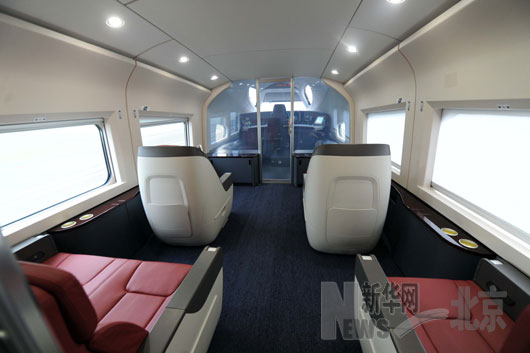Train speed claims were false
 0 Comment(s)
0 Comment(s) Print
Print E-mail
Shanghai Daily, June 22, 2011
E-mail
Shanghai Daily, June 22, 2011
 |
|
The sightseeing carriage of the Beijing-Shanghai high-speed railway. |
The former railway minister exaggerated the potential performance of trains on the Shanghai-Beijing high-speed link, a former deputy chief engineer at the ministry has claimed.
Liu Zhijun, who was dismissed in February in a graft probe, had said the train would reach a maximum speed of 380kph and maintain a constant speed of 350kph.
But Zhou Yimin told yesterday's 21st Century Business Herald that the train could only reach 350kph for a few minutes at a time.
The high-speed train was developed by China based on foreign technology. The foreign manufacturers clearly stated in their contract that the maximum operational speed was 300kph, Zhou told the newspaper.
If the train ran at 350kph, it was operating beyond the safety margin.
"If any problem happens while the train is running at such a high speed, the consequences would be unimaginable, as China doesn't have the experience and technology to solve the issue," Zhou was quoted as saying.
High-speed trains made by Japan and France had reached 440kph and 574kph in test runs and but tests runs and daily operation were totally different things, Zhou said.
Zhou said that an official with Siemens AG, which sold components to Chinese train makers, once told him they didn't care how China promoted the technology as long as Siemens could seal the deal; secondly, the technology they sold was designed for a top speed of 300kph. If the trains ran faster than that, they wouldn't be responsible for any consequences.
Zhou said China had made a big leap in technological know-how after importing technical platforms but still lacked core research and development capacity.
Some minor problems had surfaced in China's high-speed railways but had been kept confidential, Zhou said.
Subsidence causing gaps of up to 40 centimeters between the ground and the track was found along the high-speed rail line linking Taiyuan, capital of Shanxi Province, and Shijiazhuang, the provincial capital of Hebei, only two years after construction was completed.
And the bullet train running between Beijing and Shenyang, capital of the northeastern Liaoning Province, had suffered several malfunctions, he said.
Zhou said he wrote a letter to the current railway minister, Sheng Guangzu, in April proposing that the planned speed on the Shanghai-Beijing bullet train be lowered.
A few days later, Sheng announced that China was slowing the operational speed of all its bullet trains from 350kph to 300kph following safety concerns and complaints that tickets were too expensive.
The Shanghai-Beijing high-speed railway began trial operations on May 11 and will be officially put into use at the end of this month.
Zhou joined in the feasibility study and research for the new service.





